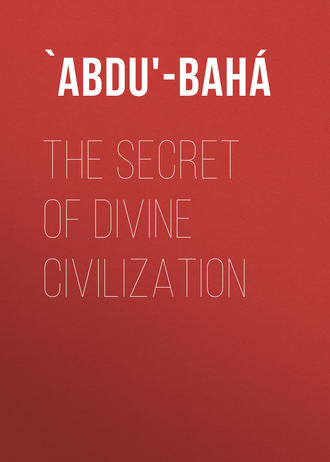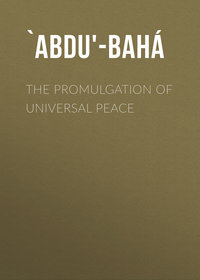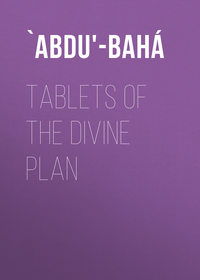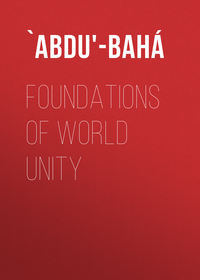 полная версия
полная версияThe Secret of Divine Civilization
Those European intellectuals who are well-informed as to the facts of Europe’s past, and are characterized by truthfulness and a sense of justice, unanimously acknowledge that in every particular the basic elements of their civilization are derived from Islám. For example Draper,58 the well-known French authority, a writer whose accuracy, ability and learning are attested by all European scholars, in one of his best-known works, The Intellectual Development of Europe, has written a detailed account in this connection, that is, with reference to the derivation by the peoples of Europe of the fundamentals of civilization and the bases of progress and well-being from Islám. His account is exhaustive, and a translation here would unduly lengthen out the present work and would indeed be irrelevant to Our purpose. If further details are desired the reader may refer to that text.
In essence, the author shows how the totality of Europe’s civilization—its laws, principles, institutions, its sciences, philosophies, varied learning, its civilized manners and customs, its literature, art and industry, its organization, its discipline, its behavior, its commendable character traits, and even many of the words current in the French language, derives from the Arabs. One by one, he investigates each of these elements in detail, even giving the period when each was brought over from Islám. He describes as well the arrival of the Arabs in the West, in what is now Spain, and how in a short time they established a well-developed civilization there, and to what a high degree of excellence their administrative system and scholarship attained, and how solidly founded and well regulated were their schools and colleges, where sciences and philosophy, arts and crafts, were taught; what a high level of leadership they achieved in the arts of civilization and how many were the children of Europe’s leading families who were sent to attend the schools of Cordova and Granada, Seville and Toledo to acquire the sciences and arts of civilized life. He even records that a European named Gerbert came to the West and enrolled at the University of Cordova in Arab territory, studied arts and sciences there, and after his return to Europe achieved such prominence that ultimately he was elevated to the leadership of the Catholic Church and became the Pope.
The purpose of these references is to establish the fact that the religions of God are the true source of the spiritual and material perfections of man, and the fountainhead for all mankind of enlightenment and beneficial knowledge. If one observes the matter justly it will be found that all the laws of politics are contained in these few and holy words:
“And they enjoin what is just, and forbid what is unjust, and speed on in good works. These are of the righteous.”59 And again: “that there may be among you a people who invite to the good, and enjoin the just, and forbid the wrong. These are they with whom it shall be well.”60 And further: “Verily, God enjoineth justice and the doing of good … and He forbiddeth wickedness and oppression. He warneth you that haply ye may be mindful.”61 And yet again, of the civilizing of human behavior: “Make due allowances; and enjoin what is just, and withdraw from the ignorant.”62 And likewise: “…who master their anger, and forgive others! God loveth the doers of good.”63 And again: “There is no righteousness in turning your faces toward the East or the West, but he is righteous who believeth in God, and the last day, and the angels, and the Scriptures, and the Prophets; who for the love of God disburseth his wealth to his kindred, and to orphans, and the needy and the wayfarer, and those who ask, and for ransom; who observeth prayer, and payeth the legal alms, and who is of those who perform their covenant when they have covenanted, and are patient under ills and hardships, and in time of trouble: these are they who are just, and these are they who fear the Lord.”64 And yet further: “They prefer them before themselves, though poverty be their own lot.”65 See how these few sacred verses encompass the highest levels and innermost meanings of civilization and embody all the excellencies of human character.
By the Lord God, and there is no God but He, even the minutest details of civilized life derive from the grace of the Prophets of God. What thing of value to mankind has ever come into being which was not first set forth either directly or by implication in the Holy Scriptures?
Alas, of what avail is it. When the weapons are in cowards’ hands, no man’s life and property are safe, and thieves only grow the stronger. When, in the same way, a far-from-perfect priesthood acquire control of affairs, they come down like a massive curtain between the people and the light of Faith.
Sincerity is the foundation-stone of faith. That is, a religious individual must disregard his personal desires and seek in whatever way he can wholeheartedly to serve the public interest; and it is impossible for a human being to turn aside from his own selfish advantages and sacrifice his own good for the good of the community except through true religious faith. For self-love is kneaded into the very clay of man, and it is not possible that, without any hope of a substantial reward, he should neglect his own present material good. That individual, however, who puts his faith in God and believes in the words of God—because he is promised and certain of a plentiful reward in the next life, and because worldly benefits as compared to the abiding joy and glory of future planes of existence are nothing to him—will for the sake of God abandon his own peace and profit and will freely consecrate his heart and soul to the common good. “A man, too, there is who selleth his very self out of desire to please God.”66
There are some who imagine that an innate sense of human dignity will prevent man from committing evil actions and insure his spiritual and material perfection. That is, that an individual who is characterized with natural intelligence, high resolve, and a driving zeal, will, without any consideration for the severe punishments consequent on evil acts, or for the great rewards of righteousness, instinctively refrain from inflicting harm on his fellow men and will hunger and thirst to do good. And yet, if we ponder the lessons of history it will become evident that this very sense of honor and dignity is itself one of the bounties deriving from the instructions of the Prophets of God. We also observe in infants the signs of aggression and lawlessness, and that if a child is deprived of a teacher’s instructions his undesirable qualities increase from one moment to the next. It is therefore clear that the emergence of this natural sense of human dignity and honor is the result of education. Secondly, even if we grant for the sake of the argument that instinctive intelligence and an innate moral quality would prevent wrongdoing, it is obvious that individuals so characterized are as rare as the philosopher’s stone. An assumption of this sort cannot be validated by mere words, it must be supported by the facts. Let us see what power in creation impels the masses toward righteous aims and deeds!
Aside from this, if that rare individual who does exemplify such a faculty should also become an embodiment of the fear of God, it is certain that his strivings toward righteousness would be strongly reinforced.
Universal benefits derive from the grace of the Divine religions, for they lead their true followers to sincerity of intent, to high purpose, to purity and spotless honor, to surpassing kindness and compassion, to the keeping of their covenants when they have covenanted, to concern for the rights of others, to liberality, to justice in every aspect of life, to humanity and philanthropy, to valor and to unflagging efforts in the service of mankind. It is religion, to sum up, which produces all human virtues, and it is these virtues which are the bright candles of civilization. If a man is not characterized by these excellent qualities, it is certain that he has never attained to so much as a drop out of the fathomless river of the waters of life that flows through the teachings of the Holy Books, nor caught the faintest breath of the fragrant breezes that blow from the gardens of God; for nothing on earth can be demonstrated by words alone, and every level of existence is known by its signs and symbols, and every degree in man’s development has its identifying mark.
The purpose of these statements is to make it abundantly clear that the Divine religions, the holy precepts, the heavenly teachings, are the unassailable basis of human happiness, and that the peoples of the world can hope for no real relief or deliverance without this one great remedy. This panacea must, however, be administered by a wise and skilled physician, for in the hands of an incompetent all the cures that the Lord of men has ever created to heal men’s ills could produce no health, and would on the contrary only destroy the helpless and burden the hearts of the already afflicted.
That Source of Divine wisdom, that Manifestation of Universal Prophethood (Muḥammad), encouraging mankind to acquire sciences and arts and similar advantages has commanded them to seek these even in the furthermost reaches of China; yet the incompetent and caviling doctors forbid this, offering as their justification the saying, “He who imitates a people is one of them.” They have not even grasped what is meant by the “imitation” referred to, nor do they know that the Divine religions enjoin upon and encourage all the faithful to adopt such principles as will conduce to continuous improvements, and to acquire from other peoples sciences and arts. Whoever expresses himself to the contrary has never drunk of the nectar of knowledge and is astray in his own ignorance, groping after the mirage of his desires.
Judge this aright: which one of these modern developments, whether in themselves or in their application, is contrary to the Divine commandments? If they mean the establishment of parliaments, these are enjoined by the very text of the holy verse: “and whose affairs are guided by mutual counsel.”67 And again, addressing the Dayspring of all knowledge, the Source of perfection (Muḥammad), in spite of His being in possession of universal wisdom, the words are: “and consult them in the affair.”68 In view of this how can the question of mutual consultation be in conflict with the religious Law? The great advantages of consultation can be established by logical arguments as well.
Can they say that it would be contrary to the laws of God to make a death sentence conditional on the most careful investigations, on the sanction of numerous bodies, on legal proof and the royal order? Can they claim that what went on under the previous government was in conformity with the Qur’án? For example, in the days when Ḥájí Mírzá Aqásí was Prime Minister, it was heard from many sources that the governor of Gulpaygán seized thirteen defenseless bailiffs of that region, all of them of holy lineage, all of them guiltless, and without a trial, and without obtaining any higher sanction, beheaded them in a single hour.
[Pages 101–116]
At one time the population of Persia exceeded fifty millions. This has been dissipated partly through civil wars, but predominantly because of the lack of an adequate system of government and the despotism and unbridled authority of provincial and local governors. With the passage of time, not one-fifth of the population has survived, for the governors would select any victim they cared to, however innocent, and vent their wrath on him and destroy him. Or, for a whim, they would make a pet out of some proven mass murderer. Not a soul could speak out, because the governor was in absolute control. Can we say that these things were in conformity with justice or with the laws of God?
Can we maintain that it is contrary to the fundamentals of the Faith to encourage the acquisition of useful arts and of general knowledge, to inform oneself as to the truths of such physical sciences as are beneficial to man, and to widen the scope of industry and increase the products of commerce and multiply the nation’s avenues of wealth? Would it conflict with the worship of God to establish law and order in the cities and organize the rural districts, to repair the roads and build railroads and facilitate transportation and travel and thus increase the people’s well-being? Would it be inconsistent with the Divine commands and prohibitions if we were to work the abandoned mines which are the greatest source of the nation’s wealth, and to build factories, from which come the entire people’s comfort, security and affluence? Or to stimulate the creation of new industries and to promote improvements in our domestic products?
By the All-Glorious! I am astonished to find what a veil has fallen across their eyes, and how it blinds them even to such obvious necessities as these. And there is no doubt whatever that when conclusive arguments and proofs of this sort are advanced, they will answer, out of a thousand hidden spites and prejudices: “On the Day of Judgment, when men stand before their Lord, they will not be questioned as to their education and the degree of their culture—rather will they be examined as to their good deeds.” Let us grant this and assume that man will not be asked as to his culture and education; even so, on that great Day of Reckoning, will not the leaders be called to account? Will it not be said to them: “O chiefs and leaders! Why did ye cause this mighty nation to fall from the heights of its former glory, to pass from its place at the heart and center of the civilized world? Ye were well able to take hold of such measures as would lead to the high honor of this people. This ye failed to do, and ye even went on to deprive them of the common benefits enjoyed by all. Did not this people once shine out like stars in an auspicious heaven? How have ye dared to quench their light in darkness! Ye could have lit the lamp of temporal and eternal glory for them; why did ye fail to strive for this with all your hearts? And when by God’s grace a flaming Light flared up, why did ye fail to shelter it in the glass of your valor, from the winds that beat against it? Why did ye rise up in all your might to put it out?”
“And every man’s fate have We fastened about his neck: and on the Day of Resurrection will We bring it forth to him a book which shall be proffered to him wide open.”69
Again, is there any deed in the world that would be nobler than service to the common good? Is there any greater blessing conceivable for a man, than that he should become the cause of the education, the development, the prosperity and honor of his fellow-creatures? No, by the Lord God! The highest righteousness of all is for blessed souls to take hold of the hands of the helpless and deliver them out of their ignorance and abasement and poverty, and with pure motives, and only for the sake of God, to arise and energetically devote themselves to the service of the masses, forgetting their own worldly advantage and working only to serve the general good. “They prefer them before themselves, though poverty be their own lot.”70 “The best of men are those who serve the people; the worst of men are those who harm the people.”
Glory be to God! What an extraordinary situation now obtains, when no one, hearing a claim advanced, asks himself what the speaker’s real motive might be, and what selfish purpose he might not have hidden behind the mask of words. You find, for example, that an individual seeking to further his own petty and personal concerns, will block the advancement of an entire people. To turn his own water mill, he will let the farms and fields of all the others parch and wither. To maintain his own leadership, he will everlastingly direct the masses toward that prejudice and fanaticism which subvert the very base of civilization.
Such a man, at the same moment that he is perpetrating actions which are anathema in the sight of God and detested by all the Prophets and Holy Ones, if he sees a person who has just finished eating wash his hands with soap—an article the inventor of which was ‘Abdu’lláh Buní, a Muslim—will, because this unfortunate does not instead wipe his hands up and down the front of his robe and on his beard, set up a hue and cry to the effect that the religious law has been overthrown, and the manners and customs of heathen nations are being introduced into ours. Utterly disregarding the evil of his own ways, he considers the very cause of cleanliness and refinement as wicked and foolish.
O People of Persia! Open your eyes! Pay heed! Release yourselves from this blind following of the bigots, this senseless imitation which is the principal reason why men fall away into paths of ignorance and degradation. See the true state of things. Rise up; seize hold of such means as will bring you life and happiness and greatness and glory among all the nations of the world.
The winds of the true springtide are passing over you; adorn yourselves with blossoms like trees in the scented garden. Spring clouds are streaming; then turn you fresh and verdant like the sweet eternal fields. The dawn star is shining, set your feet on the true path. The sea of might is swelling, hasten to the shores of high resolve and fortune. The pure water of life is welling up, why wear away your days in a desert of thirst? Aim high, choose noble ends; how long this lethargy, how long this negligence! Despair, both here and hereafter, is all you will gain from self-indulgence; abomination and misery are all you will harvest from fanaticism, from believing the foolish and the mindless. The confirmations of God are supporting you, the succor of God is at hand: why do you not cry out and exult with all your heart, and strive with all your soul!
Among those matters which require thorough revision and reform is the method of studying the various branches of knowledge and the organization of the academic curriculum. From lack of organization, education has become haphazard and confused. Trifling subjects which should not call for elaboration receive undue attention, to such an extent that students, over long periods of time, waste their minds and their energies on material that is pure supposition, in no way susceptible of proof, such study consisting in going deep into statements and concepts which careful examination would establish as not even unlikely, but rather as unalloyed superstition, and representing the investigation of useless conceits and the chasing of absurdities. There can be no doubt that to concern oneself with such illusions, to examine into and lengthily debate such idle propositions, is nothing but a waste of time and a marring of the days of one’s life. Not only this, but it also prevents the individual from undertaking the study of those arts and sciences of which society stands in dire need. The individual should, prior to engaging in the study of any subject, ask himself what its uses are and what fruit and result will derive from it. If it is a useful branch of knowledge, that is, if society will gain important benefits from it, then he should certainly pursue it with all his heart. If not, if it consists in empty, profitless debates and in a vain concatenation of imaginings that lead to no result except acrimony, why devote one’s life to such useless hairsplittings and disputes.
Because this matter requires further elucidation and a thorough hearing, so that it can be fully established that some of the subjects which today are neglected are extremely valuable, while the nation has no need whatever of various other, superfluous studies, the point will, God willing, be developed in a second volume. Our hope is that a reading of this first volume will produce fundamental changes in the thinking and the behavior of society, for We have undertaken the work with a sincere intent and purely for the sake of God. Although in this world individuals who are able to distinguish between sincere intentions and false words are as rare as the philosopher’s stone, yet We fix Our hopes on the measureless bounties of the Lord.
To resume: As for that group who maintains that in effecting these necessary reforms we must proceed with deliberation, exercise patience and gain the objectives one at a time, just what do they mean by this? If by deliberation they are referring to that circumspection which the science of government requires, their thought is timely and appropriate. It is certain that momentous undertakings cannot be brought to a successful conclusion in haste; that in such cases haste would only make waste.
The world of politics is like the world of man; he is seed at first, and then passes by degrees to the condition of embryo and foetus, acquiring a bone structure, being clothed with flesh, taking on his own special form, until at last he reaches the plane where he can befittingly fulfill the words: “the most excellent of Makers.”71 Just as this is a requirement of creation and is based on the universal Wisdom, the political world in the same way cannot instantaneously evolve from the nadir of defectiveness to the zenith of rightness and perfection. Rather, qualified individuals must strive by day and by night, using all those means which will conduce to progress, until the government and the people develop along every line from day to day and even from moment to moment.
When, through the Divine bestowals, three things appear on earth, this world of dust will come alive, and stand forth wondrously adorned and full of grace. These are first, the fruitful winds of spring; second, the welling plenty of spring clouds; and third, the heat of the bright sun. When, out of the endless bounty of God, these three have been vouchsafed, then slowly, by His leave, dry trees and branches turn fresh and green again, and array themselves with many kinds of blossoms and fruits. It is the same when the pure intentions and the justice of the ruler, the wisdom and consummate skill and statecraft of the governing authorities, and the determination and unstinted efforts of the people, are all combined; then day by day the effects of the advancement, of the far-reaching reforms, of the pride and prosperity of government and people alike, will become clearly manifest.
If, however, by delay and postponement they mean this, that in each generation only one minute section of the necessary reforms should be attended to, this is nothing but lethargy and inertia, and no results would be forthcoming from such a procedure, except the endless repetition of idle words. If haste is harmful, inertness and indolence are a thousand times worse. A middle course is best, as it is written: “It is incumbent upon you to do good between the two evils,” this referring to the mean between the two extremes. “And let not thy hand be tied up to thy neck; nor yet open it with all openness … but between these follow a middle way.”72
The primary, the most urgent requirement is the promotion of education. It is inconceivable that any nation should achieve prosperity and success unless this paramount, this fundamental concern is carried forward. The principal reason for the decline and fall of peoples is ignorance. Today the mass of the people are uninformed even as to ordinary affairs, how much less do they grasp the core of the important problems and complex needs of the time.
It is therefore urgent that beneficial articles and books be written, clearly and definitely establishing what the present-day requirements of the people are, and what will conduce to the happiness and advancement of society. These should be published and spread throughout the nation, so that at least the leaders among the people should become, to some degree, awakened, and arise to exert themselves along those lines which will lead to their abiding honor. The publication of high thoughts is the dynamic power in the arteries of life; it is the very soul of the world. Thoughts are a boundless sea, and the effects and varying conditions of existence are as the separate forms and individual limits of the waves; not until the sea boils up will the waves rise and scatter their pearls of knowledge on the shore of life.
Thou, Brother, art thy thought alone,The rest is only thew and bone.73Public opinion must be directed toward whatever is worthy of this day, and this is impossible except through the use of adequate arguments and the adducing of clear, comprehensive and conclusive proofs. For the helpless masses know nothing of the world, and while there is no doubt that they seek and long for their own happiness, yet ignorance like a heavy veil shuts them away from it.











